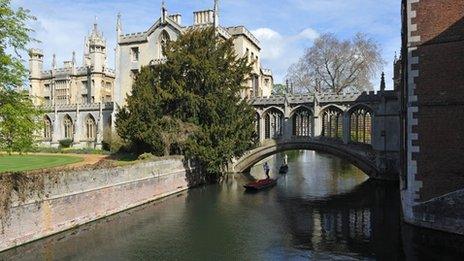Cambridge academics call for more women professors
- Published

Academics want a more female-friendly approach to appointing senior staff
More than 50 Cambridge University academics are calling for a different way of making senior appointments to tackle the lack of female professors.
They want a more "inclusive" recruitment process that takes into account a wider range of skills.
At present 22% of professors in UK universities are women.
The group of Cambridge academics says that recruitment should consider aspects such as teaching and outreach work as well as academic publications.
The proposals, to be published in a letter to the Times Higher Education magazine, call for a way of measuring applications that they say will not unduly advantage men.
They say the step up to becoming a professor depends on too narrow a set of achievements, such as publications in academic journals and research grants.
Instead they want to include other experiences from academics' working lives.
'Different types of success'
"A broader, more inclusive approach to success and promotion, where other academic contributions, including teaching, administration and outreach work are valued, would make it easier for women to advance," the academics argue.
Professor Athene Donald, gender equality champion at the university, says: "Our experience at Cambridge, where we have recently surveyed 126 female academics and administrators on this subject, suggests that this is indeed the case.
"Women seem to value a broader spectrum of work-based competencies that do not flourish easily under the current system," she said.
"There will always be hardcore metrics for academics, such as grants, or prizes won, and books and papers published, and they are important. But there are opportunities to reward and embed different types of success, such as teaching, outreach and departmental support."
Figures for 2012-13 from the Higher Education Statistics Agency show that 45% of all academic staff are women, but 78% of professors are men.
Women are more likely to apply to enter university as undergraduates than men, with the latest Ucas admissions figures showing that 58% of applicants were female.